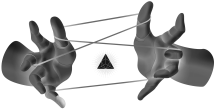Cat’s Cradle

By Kurt Vonnegut (1963)
Something of a succès d’estime in reverse, this book won admiration for its bleak humour, deadpan reportage and sci-fi elements, until the rot set in and everyone realised that it wasn’t hugely good, with its glib, jerky, episodic micro-chapters, cardboard characters and terrible snatches of verse. Vonnegut was not yet really a novelist; Cat’s Cradle is not really a novel. But here Kurt is an accumulator of ‘bits,’ an amasser of literary bitcoin, and some of his stock is quite brilliant. His false religion, Bokononism, owes something to Spinoza, but with typical jokey authorial touches – the doctrine infused with foma (harmless untruths), the teams of unrelated and oblivious persons somehow related (a karass), and the fulcrum of a karass, a wampeter. Unlike Spinoza, Vonnegut’s humourously desolate theology (with built-in “more zest, more tang“) is deeply nihilistic, which is why, whilst often top drawer, the comedy carries something of an antiseptic sting.
These are pleasant diversions, as is the thin but rich account of eccentric scientists and their indifference to logical outcomes of their research, but the binding triumph of this satiric novella – the brilliant bit – is Vonnegut’s absent-minded professor, Felix Hoenikker (he plays ‘Cat’s Cradle’ with a piece of string while the bomb he developed is dropping on Hiroshima) and his other invention, Ice-nine. Ice-nine is an alternative structure of water that is solid at room temperature and acts as a seed crystal upon contact with ordinary liquid water, causing that liquid water to instantly transform into more Ice-nine, and so on, and compounding, until all the water in a closed system is transformed and the world ends. Such a plaything was given casually by Hoenikker “to such short-sighted children as almost all men and women are…” Written in the shadow of the Cuban Missile Crisis, part of the cold-war nuclear games of chicken with its doctrine of Mutually Assured Destruction, Ice-nine beautifully symbolizes the book’s skepticism about science-sans-morality, the turning of technology towards evil ends, and laughing nihilism.
We won’t describe the shenanigans that take the narrator – ostensibly researching the life of the Professor – to the Caribbean island of San Lorenzo, inhabited by various professorial issue and headed by a Papa Doc figure who keeps his peasants in line with a corrupted version of Bokononism and threat of being hung from a Hook – and also where we confront Ice-nine, the stuff of which nightmares are made (Don’t gingerly test it with the tip of your tongue). Ice-nine’s ability to replicate and extend renders it as pervasive as the 2 most common elements in the universe, hydrogen and stupidity.
Instead of a synopsis, let’s salt, or sweeten our summary of Cat’s Cradle with some nice extracts:
“She believed that God liked people in sailboats much better than He liked people in motor boats.”
“When it [the rain] fell, it would freeze into hard hobnails of ice-nine – and that would be the end of the world! And the end of the interview, too! Good-bye!”
“There was a sign hung around my dead cat’s neck. It said, Miaow.”
“‘Americans’, he said, quoting his wife’s letter to the Times, ”are forever searching for love in forms it never takes, in places it can never be.””
“Never index your own book.”
“Crosby was in his cups and had the drunkard’s illusion that he could speak frankly, provided he spoke affectionately.”
“When Johnson and McCabe came upon the city, it was built of twigs, tin, crates, and mud – rested on the catacombs of a trillion happy scavengers, catacombs in a sour mash of slop, feculence, and slime.”
“It posed the question posed by all such stone piles: how had puny men moved stones so big? And, like all such stone piles, it answered the question itself. Dumb terror had moved those stones so big.”
“The Fourteenth Book of Bokonon is entitled, ‘What Can a Thoughtful Man Hope for Mankind on Earth, Given the Experience of the Past Million Years?’ It doesn’t take long to read The Fourteenth Book. It consists of one word and a period. This is it: ‘Nothing.'”
“Science is magic that works.”

Leave a comment...
While your email address is required to post a comment, it will NOT be published.


0 Comments